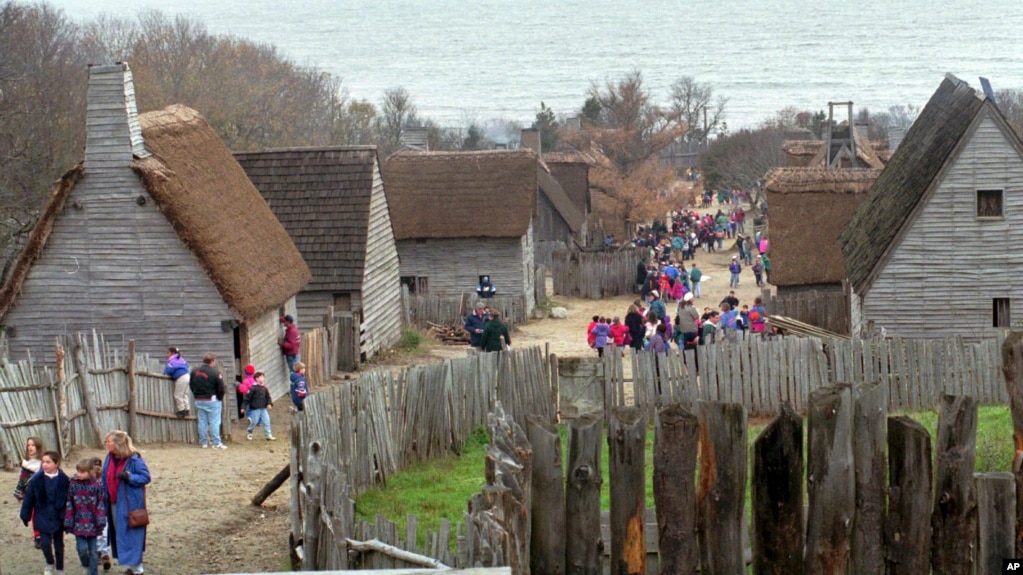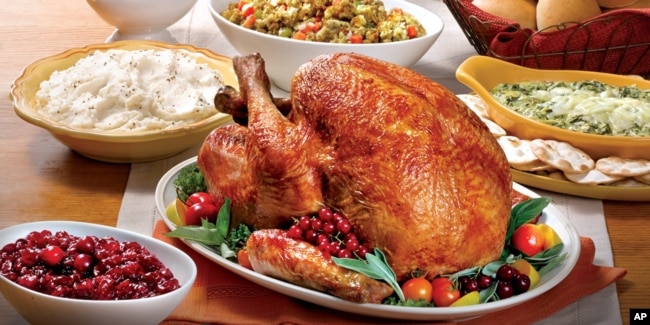Native Americans and the First Thanksgiving

The Thanksgiving holiday is when Americans try to spend time with family, eat a tasty meal and give thanks for the meaningful things in life. This year, the holiday falls on November 25.
The historical facts of the holiday, however, have long been debated.
Ramona Peters is a historic preservation officer of the Mashpee Wampanoag Tribe in the state of Massachusetts. The Native American group was part of what is said to be the first Thanksgiving in 1621.
She describes the first Thanksgiving this way:
In the fall of 1621, early settlers called Pilgrims celebrated their first successful harvest in the New England area of the present-day United States. They celebrated by firing guns and cannons in Plymouth. The noise surprised ancestors of the modern-day Wampanoag Nation. So, they went to investigate.
This is how native people came to be present at the first Thanksgiving, Peters said. She added that the time was marked by mistrust and tension.
The description of the events suggests that paintings showing Native Americans sitting down for a peaceful meal with colonial families is largely a lie.
The Wampanoag might have shared food with the Pilgrims during their fact-finding mission. But they also hunted for food and probably ate very different things than the foods connected with today’s Thanksgiving holiday.
What was served on the first Thanksgiving?
What was actually eaten at that first Thanksgiving was likely much different than the turkey, potatoes and stuffing that many American families eat today. That information comes from an expert at Plimoth Plantation, a living history museum in Plymouth, Massachusetts.

"We...know turkey was plentiful in Plymouth Colony, but we don't know for certain that it was served at the meal," Plimoth Plantation's Kate Sheehan told VOA in an email. She also believes seafood might have been among the foods served. "Mussels, lobster and eel were available as well, and enjoyed by both the English and Wampanoag."
Plimoth Plantation attempts to copy the Plymouth Colony settlement established by English colonists in the 1600s. Modern experts can make educated guesses about what might else have been on the first Thanksgiving table. It is likely that many kinds of vegetables and herbs were among the available foods.
"English gardens probably produced cabbages, carrots, cucumbers, colewort (or collards), parsnips, turnips, beets, onions, radishes, lettuce and spinach, as well as sage, thyme, parsley, marjoram, fennel, anise and dill," Sheehan said.
"Wampanoag and English women also cultivated beans and squashes, including pumpkins," she added.
When did they celebrate?
Americans now celebrate Thanksgiving on the fourth Thursday in November. But historians do not know the date of the very first Thanksgiving.
"We know it took place over three days sometime between mid-September and early November in 1621, and was considered a harvest celebration following a successful planting of multicolored flint corn, or maize," Sheehan explained.
It was not until 1863, during the Civil War, that Thanksgiving became a national holiday. Some explanations say President Abraham Lincoln supported the idea of an idealistic Thanksgiving in hopes of bringing the country together.
Peters, of the Mashpee Wampanoag Tribe, said a woman named Sarah Josepha Hale had a part in the holiday’s development. Hale was the editor of an influential women’s magazine. She said Hale had told President Lincoln that a national Thanksgiving holiday would help unite the war-torn country.
"It was a socio-political move to try to reunite the North and the South after the Civil War to have this national holiday," Peters said.
“It was actually a pretty smart move to establish something to unite families. During the Civil War, a lot of families actually split down the middle, brothers against brothers.”
How do Native Americans celebrate today?
Today, Native Americans mark Thanksgiving in different ways. Some consider it a day of mourning because of the destruction that colonization and displacement caused for their people. Others gather with their families, but they do not think about the Pilgrims.
Peters said native people celebrate many thanksgivings throughout the year. They celebrate when certain crops come in or when fish return to release their eggs in nearby waters.
Giving thanks, Peters added, is a big part of the Wampanoag members' spiritual life.
Words in This Story
guess –n. an attempt to give an opinion or answer about something when you do not know much about it or are not sure about it
idealistic –adj. the ideas of a person who believes that it is possible to live by very high rules of behavior and honesty
cultivate –v. to grow, raise or develop
table –n. a piece of furniture that has a flat top and one or more legs
certain –adj. used to modify something or someone that is not named specifically
herb –n. a plant or part of a plant that is used as medicine or to prepare food
stuffing –n. a seasoned food mixture that is often put inside another food


